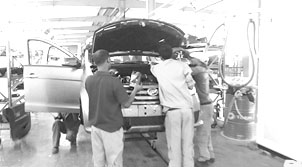
Non-oil, landlocked and yet growing economy, Ethiopia, toils too much to obtain hard currency and to keep the changes on track. But the volume of imports which well outstrips exports makes the path so rocky. The investment policy of the country is meant to place the country as a hub of light manufacturing industries in the East Africa. Hence, investors of both domestic and foreign origins are assured of incentive packages of various sorts.
Currently, automobile manufacturers have started to eye the promising businesses of the growing economy of Ethiopia.
Investment Commissioner Abebe Abebayehu, and Thomas Schaefer Head of Volkswagen Group signed a memorandum of understanding (MoU) in the presence of German President Frank-Walter Steinmeier and Ethiopia’s Minister of Finance, Ahmed Shide, news report by the Ethiopian News Agency (ENA) posted on its site last January indicates. “Ethiopia becomes the third country in Sub-Saharan Africa to sign a Memorandum of Understanding with Volkswagen.
It follows Ghana and Nigeria who both signed MoU’s with Volkswagen in August 2018,” it adds. Volkswagen will focus on four key pillars: the establishment of a vehicle assembly facility, localization of automotive components, introduction of mobility concepts such as App-based car sharing and ride hailing as well as the opening of a training center.
The company works hand in glove with the Ethiopian higher education and training institutions to transfer skills and to build local talent. This Volkswagen is end manufacturer, opening of this anchor manufacturer initiate most Ethiopian investors to supply or produce materials that need the end manufacturer, like glass tire, leather, textile and the other body parts and it has also employment opportunity, knowledge and skill transfer, and its income generate for the country.
Investment Commissioner Chief of Staff Hilina Getachew says there are 44 licensed investors that opts for engaging in the auto manufacturing but only 20 of them are active , from this, more than 50 percent of the companies are from china, and also others are from Korea and Japan. Investment Commission has been doing a research on automotive strategy, joining hands with other government institutions. The strategy is meant to improve and use Ethiopian input for this industry.
Ministry of Revenue and National Bank facilitate and offer incentives for automotive investors that operate both in and outside the industrial parks, according to her. For instance, those in the industrial parks get up to 10-year income tax exemption, and a company who works out of the industrial parks in Addis and special zone of Oromia surrounding Addis can get two years income tax exemption.
In addition to the employment creation and import substitution, the auto industry helps reduce hard currency outflow, not to mention its role for public health by reducing road traffic accident caused by imported second-hand cars.
The Ethiopian Herald April 12, 2019
BY BETHLEHEM ASFAW




